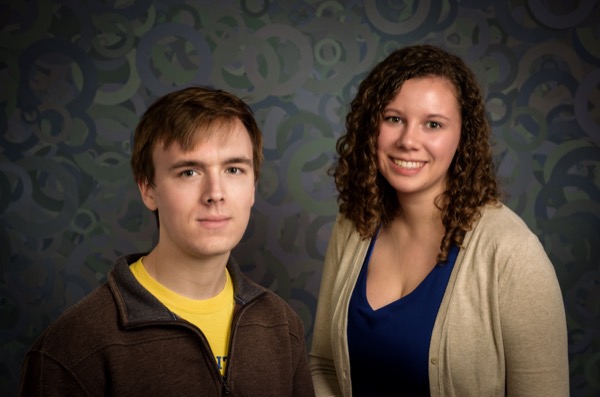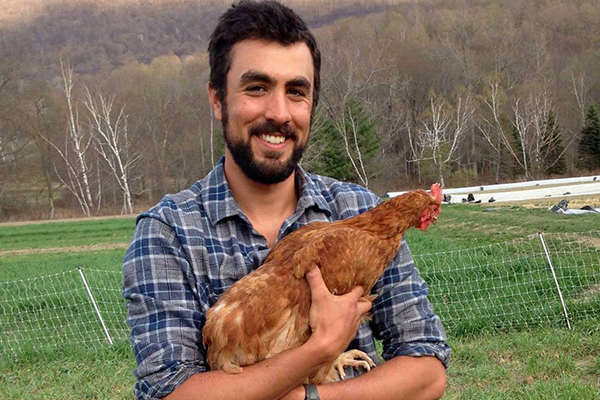NSF Graduate Research Fellows
Three from UD will study biomedical engineering, physical chemistry, planning
9:29 a.m., April 26, 2016--The National Science Foundation has named two University of Delaware undergraduate students and one alumnus to its list of 2016 Graduate Research Fellows, providing financial support for their continuing studies.
The new fellowships go to Bretta Fylstra of Harrisburg, Pennsylvania, who will study biomedical engineering in a joint program at the University of North Carolina and North Carolina State University; Thomas Keane of Warwick, New York, who will study physical chemistry at Harvard University; and Daniel Reyes of West Milford, New Jersey, who will study urban and regional planning at the University of Pennsylvania.
Honors Stories
National Medal of Science
Warren Award
The NSF fellowships recognize outstanding students in the fields of science, technology, engineering and mathematics (STEM). UD's winners were among almost 17,000 applicants for 2,000 awards. The NSF also recognized 2,997 honorable mentions, including 19 UD students or alumni.
"These awards are provided to individuals who have demonstrated their potential for significant research achievements, and they are investments that will help propel this country's future innovations and economic growth," said Joan Ferrini-Mundy, NSF assistant director for education and human resources, in the foundation’s announcement.
Fylstra, an Honors Program student, said she has known since eighth grade that she wanted to study biomedical engineering – possibly because her mother is a nurse and her father a chemical engineer. She will continue her study of prosthetics and orthotics and work toward a doctorate, and hopes to use her knowledge to lead research and development at the industry level.
Her research at UD has focused on customizing the design of footplates for ankle/foot orthotics made on a 3-D printer under the guidance of Elisa Arch, assistant professor of kinesiology and applied physiology in the College of Health Sciences.
Fylstra was one of the founders of UD's Prosthetics and Orthotics Club, which unites students interested in that research and/or clinical work. Among their projects was an effort to develop a prosthetic device for a dog that had lost a leg. The device is in revision now, she said.
Earlier this month her team, Rehab to Go, won the Innovation Award in the First Step Grand Challenges competition to further its tests of a device that provides biofeedback to amputees, helping them optimize their gait and walking patterns as they transition to prosthetic devices.
Keane will work toward a doctorate in physical chemistry at Harvard, focusing on sustainable chemistry and building on research he has done in the lab of UD's Joel Rosenthal, associate professor of chemistry and biochemistry.
He is still exploring lab opportunities at Harvard, with interest in energy storage and efficiency, especially developing energy-efficient catalysts for industrial applications.
Keane, also an Honors Program student, he said he was drawn to research after participating in an introductory program during high school. After enrolling at UD, he found Rosenthal's focus on converting carbon dioxide into liquid fuels most interesting.
"The more research I did and the more I got involved in the science, the more it struck that this was not only something scientifically very interesting, but at the same time the problems that type of research and sustainable chemistry addresses are problems that are very important and need to be answered, hopefully in the near future," he said.
Reyes, an Honors Program student who graduated from UD with a degree in anthropology in 2012, will study urban and regional planning at Penn.
His interest lies in food systems, local infrastructures that support farmers and what kinds of foods are available to people. Since his graduation from UD, he has worked with the Food Bank of Delaware, has worked on food assistance policy in the United States, and has worked with subsistence farmers in Central America and small farms in the northeast U.S.
Now he is working as an apprentice on a Bordentown, New Jersey, farm, growing more than 50 varieties of vegetables and building his knowledge of what it takes to make farming work.
"One common thread I've found is that local resource governance can play a huge role in determining what food systems look like in terms of land use and what sort of foods are available to people of all socio-economic statuses," he said. "I hope to look at ownership alternatives for productive land in the northeast United States and Central America."
Many farming options are determined by such things as zoning, runoff management, land titling, he said, and that makes such technical studies valuable.
The NSF fellowship provides three years of financial support for study that leads to a research-based master's or doctoral degree within a five-year period ($34,000 annual stipend and $12,000 cost-of-education allowance to the graduate institution).
Article by Beth Miller
Photos by Kathy F. Atkinson and courtesy of Daniel Reyes












